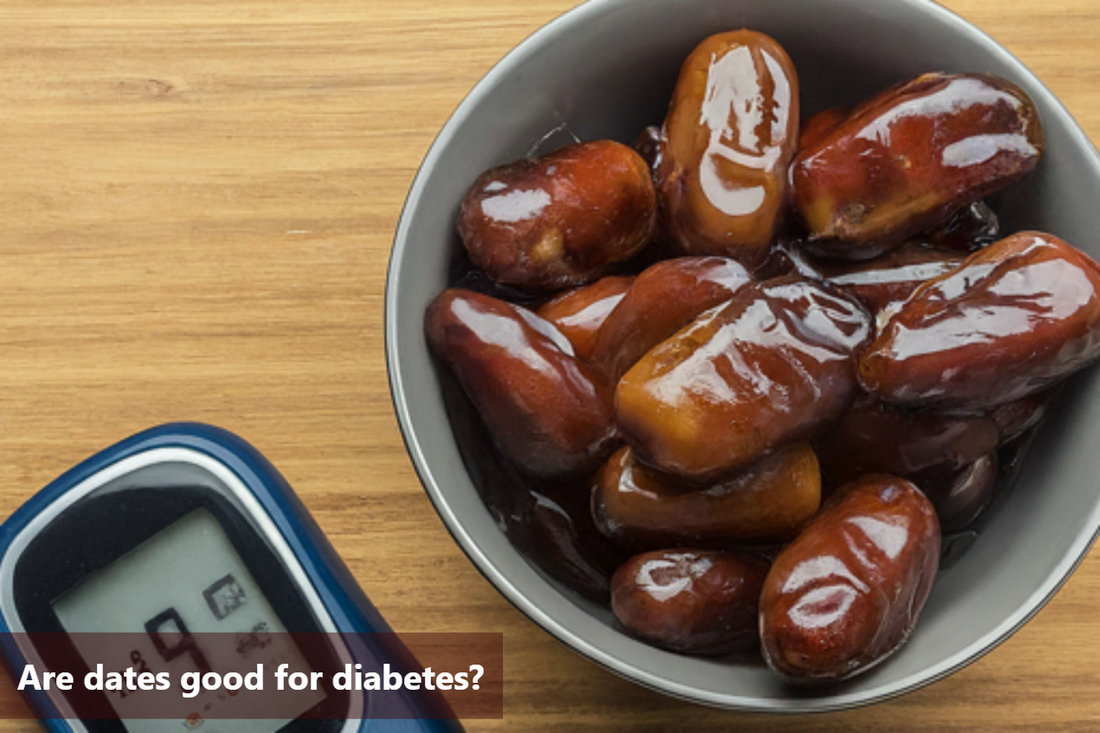Diabetes is a condition that affects sugar metabolism. Managing blood sugar levels is crucial. Are dates good for diabetes? Dates are sweet and nutritious, with a low glycemic index. They can be included in a diabetic diet with moderation.
Nutritional Content of Dates
A 3.5-ounce (100-gram) serving of Medjool dates provides the following nutrients:
|
Calories |
277 |
|
Carbs |
75 grams |
|
Fiber |
7 grams |
|
Protein |
2 grams |
|
Potassium |
15% DV |
|
Magnesium |
13% DV |
|
Copper |
40% DV |
|
Manganese |
13% DV |
|
Iron |
5% DV |
|
Vitamin B6 |
15% DV |
Effects of Dates on Blood Sugar Levels
-
Blood sugar spikes: Dates have a high carbohydrate and natural sugar content, leading to significant spikes in blood sugar levels after consumption.
-
Glycemic index: Dates have a relatively high glycemic index, causing a rapid increase in blood glucose levels post-consumption.
-
Elevated post-meal blood sugars: Studies have shown that consuming dates can result in elevated blood sugars after meals, posing challenges for diabetes management.
-
Moderation and meal planning: It is advisable for individuals with diabetes to consume dates in moderation and consider overall carbohydrate intake when planning meals.
-
Pairing with protein and healthy fats: Pairing dates with foods rich in protein and healthy fats can help mitigate their impact on blood sugar levels.
-
Fiber Content: Dates are rich in dietary fiber, which slows down the digestion and absorption of sugars into the bloodstream. This helps prevent rapid spikes in blood glucose levels after consuming dates.
-
Low to Moderate Glycemic Index: While dates have a high glycemic index (GI), ranging from 42 to 62, the presence of fiber can moderate their glycemic impact. Choosing less ripe or lower GI varieties can further reduce their impact on blood sugar levels.
-
Nutrient Density: Dates are packed with essential nutrients such as potassium, magnesium, and vitamin B6, which support overall health. These nutrients can help improve insulin sensitivity and glucose metabolism.
-
Satiety: The fiber and natural sugars in dates can promote a feeling of fullness and satisfaction, which may help prevent overeating and contribute to better blood sugar control over time.
Ways to Incorporate Dates into a Diabetic Diet:
-
Alternative to Refined Sugars: Dates can serve as a natural sweetener in recipes and snacks, providing sweetness without the negative effects associated with refined sugars.
-
Portion Control: Limit portion sizes to a small amount, such as one or two dates, to minimize the impact on blood sugar levels.
-
Pair with Protein or Fiber: Pair dates with foods that contain protein or fiber, such as nuts or seeds, to slow down the absorption of sugars and mitigate their impact on blood glucose levels.
-
Consider Timing: Consume dates as part of a balanced meal to help balance their glycemic impact with other nutrients.
-
Monitor Blood Sugar Levels: If you have diabetes or are concerned about how dates affect your blood sugar, monitor your levels before and after consuming them to understand their specific impact on your body.
Bottom Line:
Diabetes is a health condition that needs you to watch your blood sugar levels. In this blog, we looked at how eating dates affects people with diabetes. Dates have natural sugar and carbohydrates, but their high fiber can slow down how fast sugar gets into your blood. This can help avoid quick spikes in blood sugar levels. Remember, if you have diabetes, eat dates in small amounts and keep an eye on how much you eat.
To sum up, you can include dates in your meals if you have diabetes, but you need to plan well and not overdo it. It's best to check your blood sugar often when you have dates and ask a doctor for advice on what to eat. It's also better to choose fresh dates instead of sugary ones for keeping your blood sugar in check.
In the end, while dates can be part of a healthy diabetic diet, they should not be the only thing you eat. Make sure to have other important foods like fruits, veggies, proteins, and whole grains as well. The secret is to eat dates mindfully and focus on a balanced diet that suits you and your diabetes.
FAQs:
Are dates safe to eat if I have diabetes?
-
Yes, dates can be consumed in moderation as part of a balanced diet for individuals with diabetes.
Do dates raise blood sugar levels quickly?
-
Dates have a high carbohydrate content and can cause a spike in blood sugar levels if consumed in large quantities. Therefore, it is important to monitor portion sizes.
How can dates be incorporated into a diabetic-friendly diet?
-
Dates can be enjoyed in small amounts as a natural sweetener in recipes, added to oatmeal, yogurt, or smoothies, or as a snack paired with a source of protein or healthy fats to help stabilize blood sugar levels.
Can dates be a better alternative to refined sugar for people with diabetes?
-
Dates contain fiber, vitamins, and minerals that refined sugar lacks. They have a lower glycemic index compared to table sugar, making them a better choice for managing blood sugar levels.
What are the potential benefits of consuming dates for individuals with diabetes?
-
Dates are a good source of fiber, which can aid in digestion and help regulate blood sugar levels. They also contain antioxidants and essential nutrients that may contribute to overall health when consumed in moderation.
This Blog post is an initiative by DiabeSmart, to provide accurate and Nutritionist / Doctor approved information related to Diabetes. DiabeSmart is India's first Food brand designed specifically for Diabetics, that has been clinically tested on Diabetics and Pre-Diabetics to deliver 55% - 70% lower Sugar spikes. DiabeSmart is part of Lo! Foods - India's leading brand for Everyday Functional Health foods.















